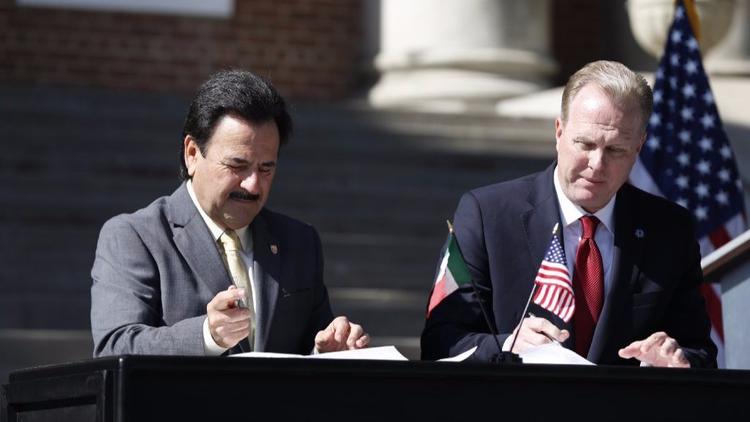This op-ed was originally published by San Diego Union-Tribune, and authored by Matt Cole, Magda Marquet and Michelle Sterling.
This is a time of profound disruption in the global economic system: The rules of global commerce are shifting rapidly, the pace of innovation and competition is generating winners and losers, and political volatility around the world is creating an uncertain environment for businesses large and small.
 Now, more than ever, it is time for cities to step up and lead. And to lead, they must be seen.
Now, more than ever, it is time for cities to step up and lead. And to lead, they must be seen.
For San Diego companies, global connectivity matters. Whether it’s biotech or manufacturing, most businesses have customers outside of San Diego, which allows them to add jobs here at home. In 2015, San Diego exported more than $17 billion in goods overseas, as well as billions more in services like software, cybersecurity, engineering and research. Small- and medium-sized businesses produce 92 percent of those goods. According to the Brookings Institution, companies that are global pay higher wages, are less likely to go out of business and increase productivity of the domestic market.
Our competitive advantage here in San Diego is that we develop and produce life-saving and life-changing technologies better than almost anywhere else in the world.
Four years ago, Althea was a midsize life sciences company with great talent and a compelling business proposition. A personal relationship, and chance meeting at a trade show, began a relationship with Japanese multinational Ajinomoto that has drawn millions of dollars of investment into the region, and enabled Althea to become a global player in the development and manufacturing of biologics and innovative pharmaceuticals.
For Cubic Transportation Systems (CTS), a business unit of Cubic Corp., providing public transportation solutions is one example of where public-private partnerships can be applied. From Chicago to Sydney, Vancouver and London, Cubic-powered technology and services move 38 million people seamlessly on a daily basis. This form of service requires collaborative working relationships between metro governments, transportation authorities and the private sector. And more often than not, these relationships need to be built over time by political and civic leadership to be effective.
Most San Diegans know the name Qualcomm but are less familiar with the transformative impact that the company has had in the world through its innovation in wireless technologies that power the global economy. What started in 1985 as a startup co-founded by a UC San Diego professor has grown into a company that has invented the technologies that make smartphones indispensable in our lives. With each technology Qualcomm invents and with each employee it hires, people from Brazil to China are learning how San Diego is changing the world.
The 600 largest cities in the world account for 60 percent of the global economy, and that economy is increasingly crowded, confusing and contested. Metros need strong leadership, unified voices and targeted strategies to compete. This is why mayors around the world are uniting to take on big issues like climate change, trade and poverty. It is why the mayors of every major U.S. city are on the road like never before, opening doors for the expansion of their regional economies. It is why we, as the Global Competitiveness Council — the voice of the global business community here in the San Diego region — called on Mayor Kevin Faulconer to be on the road to help out.
The mayor responded to this call by the business community, and is traveling to Mexico City, Vancouver and London in 2017 to create civic and academic partnerships, to facilitate deals that create jobs for San Diegans, and, most importantly, to create a framework for engagement with our most important markets. Our hope is that companies of all sizes seize the opportunities the mayor is creating.
We know what an innovative, collaborative and life-changing place San Diego is; but now more than ever, we need our leadership telling that story here at home and around the world. Our economy depends on it.
Cole is president of Cubic Transportation Systems. Marquet is co-founder of Ajinomoto Althea and AltheaDX. Sterling is executive vice president of human resources at Qualcomm.
Mayors of every major U.S. city are on the road like never before, opening doors for the expansion of their regional economies.